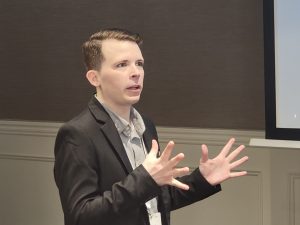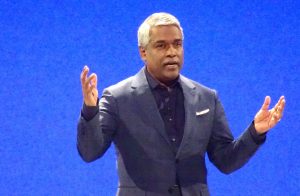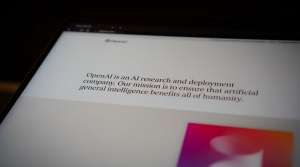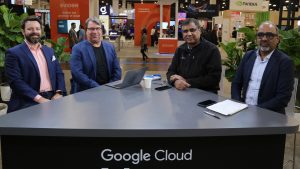Big Data is coming alive, sports leading the way | #SportsDataSV
![]() Big Data is coming alive in a very real way in Northern California. SiliconANGLE’s John Furrier and Wikibon’s Jeff Kelly sat down with top figures of the professional sports teams that call the Silicon Valley area home and discussed how their teams have embraced emerging technologies aimed at achieving successful front office operations, providing enhanced player and draft statistics on the field and improving the overall fan experience.
Big Data is coming alive in a very real way in Northern California. SiliconANGLE’s John Furrier and Wikibon’s Jeff Kelly sat down with top figures of the professional sports teams that call the Silicon Valley area home and discussed how their teams have embraced emerging technologies aimed at achieving successful front office operations, providing enhanced player and draft statistics on the field and improving the overall fan experience.
Tech-Targeting Future Fans
.
The idea that Big Data will be used in that third avenue is going to be one of the drivers for future wider adoption by the Enterprise in other industries. The near seamless integration of the technology in stadiums aimed at the fan user will appear similar to the rapid and widespread acceptance and adoption of mobile technology over the past decade. Once the general public is able to get their heads around what is now an amorphous concept, via the sports arena, there will be an increased pressure demand for the technology in other industries aimed at the customer level. And that can only be achieved, as was voiced in most of the interviews, when the organization as a whole works top to bottom to use the new technology to both streamline and add depth to their entire organization.
![]() During the interview featuring Dave Koval, President of the MLS San Jose Earthquakes, the more interesting take away was the realization that though each interview dealt with a major league sport, there is no one-size fits all approach for overall implementation. Koval cited specific technology requirements based on their fan demographic. Speaking to the organizations philosophy on tech Koval said, “I see it as an enabler. It helps create a better experience. One-third of our fans are millenials who only interact via their mobile. If you don’t support that and their needs, they turn off.”
During the interview featuring Dave Koval, President of the MLS San Jose Earthquakes, the more interesting take away was the realization that though each interview dealt with a major league sport, there is no one-size fits all approach for overall implementation. Koval cited specific technology requirements based on their fan demographic. Speaking to the organizations philosophy on tech Koval said, “I see it as an enabler. It helps create a better experience. One-third of our fans are millenials who only interact via their mobile. If you don’t support that and their needs, they turn off.”
But perhaps the most interesting innovation on the fan front is how the Earthquakes have endeavored to communicate with current and potential fans. “We have a Business Information unit with data scientists taking all of the information they can from soccer fans and bringing them together around the Quakes,” Koval stated. “We even look at the [style of] language they use online and try to ascertain their personality to tailor our communications to them. It allows us to be able to market to them one-on-one.”
Focusing On The Fan Experience
.
![]() If football is more your cup of tea, you’ll want to go to the SiliconANGLE channel on YouTube to watch the interview with Doug Garland, General Manager of Stadium Experience and Technology for the San Francisco 49ers. It appears they have taken a page from NASCAR with regard to improving overall fan engagement and their future initiatives are, no doubt, going to revolutionize the fan experience in a big way.
If football is more your cup of tea, you’ll want to go to the SiliconANGLE channel on YouTube to watch the interview with Doug Garland, General Manager of Stadium Experience and Technology for the San Francisco 49ers. It appears they have taken a page from NASCAR with regard to improving overall fan engagement and their future initiatives are, no doubt, going to revolutionize the fan experience in a big way.
Garland provided an interesting equation during the conversation. Citing the 160-foot wide Mitsubishi HD installed at AT&T Stadium in Arlington, Texas, he stated no such centerpiece would be going into the new Levi Field. The stadium, with a capacity of 70,000, is located in a region of the country where users replace mobile devices every year and a half at a price of $1,000. Rather than, as a team, spending $70 million on a large centerpiece screen, the 49ers opted to focus on putting together a network, including WiFi, that would utilize the screens nearly every fan is carrying with them.
At the new Levi Stadium, the fan experience via mobile device will begin before driving onto the property. From directing the fan to the stadium and to an available parking area through real-time data to letting them know which bathroom has the shortest lines, the fan’s handheld device will be key to providing an improved experience.
“What else are we going to do? One of the other areas that we know is a big hassle for fans at the game is waiting in long lines at concession stands. If you go to a football game and you get hungry, you are trying to figure out which part of which quarter do I have to miss so I can go get that hot dog,” Garland explained. “That’s a trade-off we don’t want our fans to have to make. So what we are going to enable at Levi Stadium is the ability for any fan sitting in any section of the stadium to order food and beverage to their seat using their mobile device.”
But the football fan experience would be nothing without the beloved replays. The San Francisco 49ers has the “competition on the couch” firmly in its crosshairs with a value-add they are perfecting right now for the new stadium. Their new innovation will be replays streamed to each and every app-enabled mobile device in the stadium within 5-seconds after every play. As Garland notes, this will apply to every play, even plays with controversial calls and plays currently under review.
After Moneyball
.
![]() An analysis of sport and Big Data that doesn’t bring the data-heavy sport of baseball into the mix would be an incomplete analysis. The importance of data on the game was highlighted by the 2011 film, Moneyball. When asked about the tension portrayed in the film between the old school scouts and the data geeks, Bill Schlough, Senior VP and CIO of the San Francisco Giants said, “I think that movie was closer to reality than a lot of people think. What’s interesting about old school scouts is that they rely on data as much as the new guys. They don’t always realize they are doing it though. They look at biomechanics.” He continued,”We are now quantifying what was once unquantifiable. That information was in the heads of the scouts. Now we have computational data models.”
An analysis of sport and Big Data that doesn’t bring the data-heavy sport of baseball into the mix would be an incomplete analysis. The importance of data on the game was highlighted by the 2011 film, Moneyball. When asked about the tension portrayed in the film between the old school scouts and the data geeks, Bill Schlough, Senior VP and CIO of the San Francisco Giants said, “I think that movie was closer to reality than a lot of people think. What’s interesting about old school scouts is that they rely on data as much as the new guys. They don’t always realize they are doing it though. They look at biomechanics.” He continued,”We are now quantifying what was once unquantifiable. That information was in the heads of the scouts. Now we have computational data models.”
While the 49ers and the Earthquakes are able to embrace and implement emerging technology from scratch with the new construction of stadiums, the Giants are in, although nationally recognized for its design and vistas, a 14 year old facility. Upgrading in an existing stadium presents its own challenges. Schlough, echoing a sentiment from every other guest of the evening, stated the importance of providing a robust wifi and 4G LTE environment for the fans. Implementation of wireless technology requires a lot of behind the scenes wiring and upgrades. However, if a fan can’t use a technology that is ubiquitous in their day-to-day lives at a sports facility then the overall fan experience is significantly diminished.
The Data Driven Front Office
.
![]() Focusing on Big Data in the front office, John Tortora, the COO of the San Jose Sharks discussed several key areas the operation is improved by the embrace of new technology. It should be noted the principal owner of the Sharks is Hasso Plattner, co-founder of SAP. So it should come as no surprise that the business operation and customer service software is SAP branded. They use the software products for tailored employee evaluation and more efficient inter-office collaboration.
Focusing on Big Data in the front office, John Tortora, the COO of the San Jose Sharks discussed several key areas the operation is improved by the embrace of new technology. It should be noted the principal owner of the Sharks is Hasso Plattner, co-founder of SAP. So it should come as no surprise that the business operation and customer service software is SAP branded. They use the software products for tailored employee evaluation and more efficient inter-office collaboration.
Tortora also pointed out the NHL has recognized the importance of Big Data at their league offices and via their weekly and bi-weekly analytics reports, individual teams are able to evaluate their own ticket and box sales and compare their volume and price points to each and every other team in the league.
We are standing on the precipice of a bold new perspective on the conduct of business. With the recognition of value for their own organizations and for the individual fan, sport organizations like the NHL, MLB, NASCAR, NFL and MLS are gently bringing their fans in for a soft landing to effect a seamless understanding and acceptance of concepts that, for now, are still murky to many in the general public and even some in the business world. The excitement that is brimming just under the surface is poised to soon revolutionize almost every aspect of our daily lives and, for now, it appears sport is leading the way.
A message from John Furrier, co-founder of SiliconANGLE:
Your vote of support is important to us and it helps us keep the content FREE.
One click below supports our mission to provide free, deep, and relevant content.
Join our community on YouTube
Join the community that includes more than 15,000 #CubeAlumni experts, including Amazon.com CEO Andy Jassy, Dell Technologies founder and CEO Michael Dell, Intel CEO Pat Gelsinger, and many more luminaries and experts.
THANK YOU













